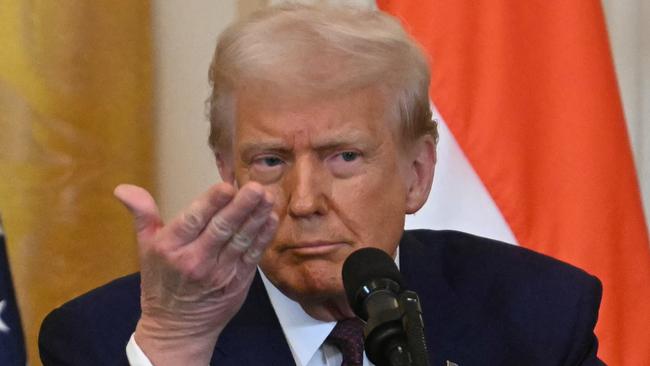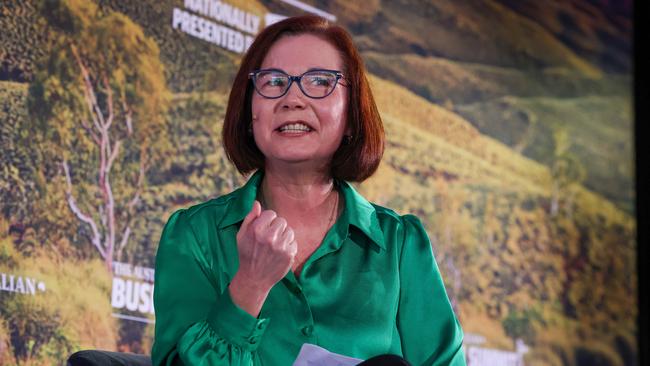Voters looking at the rest of the world might be tempted to ask: why bother?
The planet’s biggest carbon dioxide emitter, China, has passed all of the European Union’s historical emissions, according to a November 19 post by Carbon Brief. Yet China plans only 30 per cent renewables by 2030 and promises to start reducing fossil fuel use that year.
Australia’s CO2 emissions are 28 per cent below 2005 levels despite rapid population growth. Bowen says Australia is on track to meet a 2030 target to cut 2005 emissions by 43 per cent. China’s emissions today are double its 2005 levels.
The world’s second biggest global CO2 emitter, the US, was sitting at 21 per cent renewables in 2020 and had planned to hit 80 per cent by 2030. That seems unlikely under the new President.
Donald Trump pulled out of the Paris Agreement on his first day in office this year, has banned offshore wind farms and proposes to expand oil and gas production. The US is already the largest producer of both.
Number three emitter, India, plans to be 50 per cent renewable by 2030 but is rapidly expanding coal-fired power station construction.
Even the activist EU has a 2030 binding renewables target of only 42.5 per cent.
So why, with 1 per cent of global CO2 emissions and tiny historical emissions, is Bowen determined to push an entire continent harder on renewables than the world’s biggest emitters are proposing for themselves?

Won’t Australia just be destroying its own power-intensive industries for almost no benefit to the planet?
Polling in Britain shows 62 per cent of voters there rate economic growth as more important than net zero emissions by 2050.
Several political parties in the EU are pushing back against net zero.
Media advocates for renewables at the Nine papers, the Guardian Australia and the ABC say renewables are the fastest growing source of electricity.
True, but at only 13.9 per cent of global power these are rises off very small bases at a time when total electricity consumption is rising, as is fossil fuel use.
These media sources like to point to countries with higher penetrations of renewables than Australia but almost never mention most of these depend on hydro-electric power.
This column pointed out on December 15 that despite spending $US2 trillion on renewable infrastructure across the world in 2024, CO2 emissions actually rose. A fact check by the Nine papers on February 11 confirmed Australian emissions, which had been falling, rose here by 1.2 million tonnes under Bowen in the 12 months to last September.
This is something voters should focus on at the upcoming election. Why are consumers and businesses here paying to lead a transition that the biggest emitters are taking more slowly?
The Australian Financial Review seems wedded to the idea that big business supports the transition to net zero. But The Australian this month has reported various business lobbies and companies calling on Bowen to slow down on renewables.
On February 4, Glen Norris and Greg Brown reported: “Chris Bowen slaps down business leaders over fears his 82 per cent green power goal is unrealistic.”
Infrastructure NSW chair Graham Bradley, a former head of the Business Council of Australia, warned Labor’s rollout was not on target.
Australian Energy Producers chief executive Samantha McCullough said the government “had done nothing to implement the goals of the Future Gas Strategy, released last year”.
This column pointed out last December that the Bowen plan would indeed need to rely on gas for firming of the grid way past 2050 because batteries and pumped hydro could not ensure the stability of the grid.
One of the world’s largest gas exporters, Australia faces building a new gas import terminal in Melbourne because of the lack of a domestic gas reservation policy and former Victorian Premier Dan Andrews’ ban on gas exploration in the state.
Bradley cited poor planning, lack of community consultation and rising costs to suggest the target date needed to be moved “to something more reasonable”.
Minerals Council CEO Tania Constable said the government did not know “how to integrate the vast amount of renewable energy without the system falling over”.

In The Australian on February 3, Brown quoted Australian Chamber of Commerce and Industry chief Andrew McKellar calling on the federal government to reconsider its 82 per cent target and speed up gas exploration.
This latest round of business leader interventions kicked off on February 2 when Brown published a page one splash on major food employers urging the government to rethink.
Independent Food Distributors Australia boss Richard Forbes said the government’s policies were driving up the price of food.
Coal was being phased out too quickly and the rate of power price increases was hurting producers and consumers, he said.
As usual, Bowen reacted by claiming coal was unreliable and too expensive, yet people who understand the policy know this is exactly what it was designed to do – wind down coal by making it less economically viable because it cannot compete when the sun shines and the wind blows. Yet coal is needed at night or in times of low wind and sunshine.
How can so many in the media allow Bowen to pretend renewables are the cheapest form of power in the face of all the facts globally about electricity price rises as renewables penetration increase?
And why the fabricated horror about the Coalition’s plan for some nuclear power generation to replace coal?
We know Labor’s renewables plans will depend on gas firming for many decades to come. Isn’t Bowen really arguing continued fossil fuel emissions from gas firming are preferable to emissions-free nuclear grid firming?
The International Energy Agency on January 15, referring to its latest paper on nuclear energy titled ‘‘The Path to a New Era for Nuclear Energy’’, said: “It’s clear today that the strong comeback for nuclear energy that the IEA predicted several years ago is well under way, with nuclear set to generate a record level of electricity in 2025.”
The IEA says “more than 70 gigawatts of new nuclear capacity is under construction globally”, and more than 40 countries plan to expand nuclear power.
The IEA paper flagged the potential of small modular nuclear reactors, which Bowen has bagged, and says “as the world’s second largest source of low emissions electricity after hydro power, nuclear today produces just under 10 per cent of global electricity supply”.
Note here that nuclear and hydro each produce more power than either wind or solar separately.
People interested in a non-ideological approach to power can find material on a new website, C2NAustralia.com.au (Coal to Nuclear). Run by structural and nuclear engineer Bruce Wymond, it supports renewables, argues opposition to nuclear is ideological and looks for bipartisan approaches to the move away from coal.







Chris Bowen, Labor’s Climate Change and Energy Minister, wants voters to know he is confident Australia will meet its target of 82 per cent renewables in the electricity system by 2030.